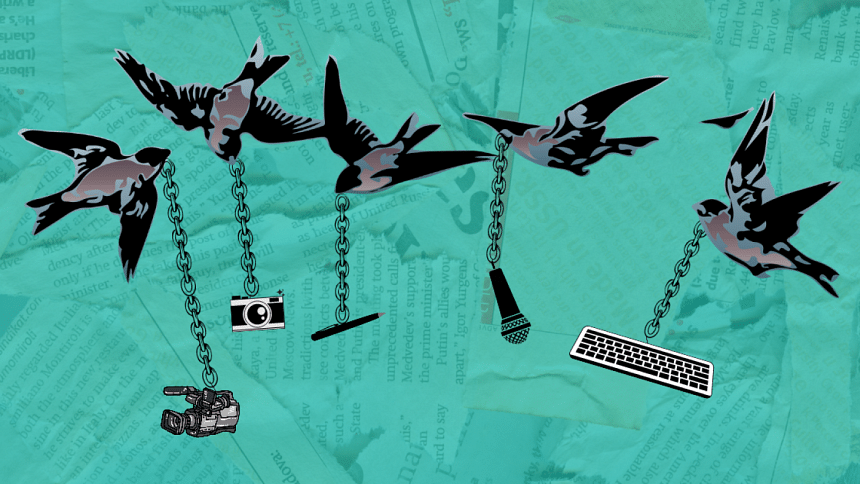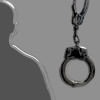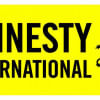World Press Freedom Day: Speak now or forever hold your tongue

Between January 2020 and February 2022, more than 200 journalists have been implicated across Bangladesh under the draconian Digital Security Act (DSA), leading, in some cases, to involuntary disappearance and pretrial detention.
In August 2021, the Bangladesh Police told me that they were not required to reveal the number of cases they filed, or the number of people they accused or arrested for online dissent under the DSA at any given time. In response to my inquiry under the country's Right to Information Act, they argued that the public disclosure of such information could "obstruct enforcement of the law."
When information is denied to people and any attempt to expose truth by journalists is penalised by authorities, the state of freedom of expression in Bangladesh, including press freedom, is not hard to guess.
In February last year, writer Mushtaq Ahmed died in prison. He had been denied bail six times over a 10-month period and held without trial simply for criticising the government's response to Covid-19 online. Another inmate alleged that Ahmed had been subjected to torture. His case exposes how the DSA has been weaponised to cruelly target dissenting voices.
During a meeting of foreign correspondents in December last year, Law Minister Anisul Huq assured those in attendance that reporters would not be arrested immediately under the DSA when cases were filed against them. Instead, they would be summoned and could seek bail from the court. His assurance arrived amid severe criticism of the law. This means that the government can bypass the law on a whim or make exceptions in order to target certain groups of people. This unnerving suggestion promotes exceptionalism and suggests that the rule of law is flexible and will not be applied equally to everyone.
Just under two months later, state critic and journalist Zohurul Haque was arrested under the DSA, which showed that the authorities intend to use the law to target anyone who does not toe the party line. Under the pretext of combating disinformation, defamation and the "deterioration of law and order," the authorities have used the DSA to incarcerate journalists and cartoonists for months, many of whom are held without trial. Even children have been targeted.
According to the international human rights law, any restrictions placed on the right to freedom of expression must be necessary, proportionate and provided by laws to protect, for example, public health or national security. Using a criminal law to combat disinformation and defamation clearly does not meet these standards.
Government policymakers remain adamant that the DSA can effectively address disinformation on digital platforms. Instead of breaking away from past acts of repression, the authorities have drafted new laws to regulate personal data, mass media, social media and over-the-top (OTT) media services like Netflix and other digital platforms. Human rights defenders, lawyers, journalists, academics, film-makers and civil society organisations all fear that these laws will be used, like the DSA, to target individuals or content deemed to be anti-state or anti-government.
The proposed Data Protection Act, for instance, gives authorities broad powers to access, control and process data without judicial oversight. This would make journalists and their sources vulnerable and would lead to heightened self-censorship as their information can be accessed by the authorities. The law would also exempt state agencies from being held accountable for violating people's right to privacy. Moreover, the authorities would use vague and overbroad descriptions, such as the need to protect the "spirit of Liberation War," "sovereignty of state" or "friendly relations with foreign states" to access private information in encrypted communications on personal devices, or to censor content on digital platforms.
This means that if someone expresses a critical view of the achievement of Bangladesh's Liberation War, or the country's relationship with another nation in a Facebook status, or even in a private message between friends on WhatsApp, that individual could be subjected to criminal punishment under the DSA, intrusive surveillance under the data protection law, or censorship under the digital, social media and OTT platform regulations.
These laws and regulations are deeply problematic and clearly arbitrary in nature. To make the new laws fair and transparent, the authorities must broaden consultations to allow the concerns of numerous independent critics to be heard. Otherwise, many more individuals, including journalists, will continue to be punished under the DSA and the new laws for criticising powerful people and holding state institutions to account.
As we observe World Press Freedom Day today, Bangladesh's record remains poor. It ranks at the bottom of the eight countries in South Asia, having slid from 146 in 2018 to 162 in 2022 on Reporters Without Borders' global press freedom index. The repression legitimised under the DSA, and the newly proposed laws signal an imminent deterioration of press freedom.
While the media and human rights and civil society organisations must play a role in lobbying for change, I hope politicians will also take concrete steps to critically and objectively review these laws, and ensure they fall in line with international human rights law and standards. It is, I am afraid, a case of now or never.
Saad Hammadi is Amnesty International's South Asia Campaigner. His Twitter handle is @saadhammadi

 For all latest news, follow The Daily Star's Google News channel.
For all latest news, follow The Daily Star's Google News channel. 







Comments